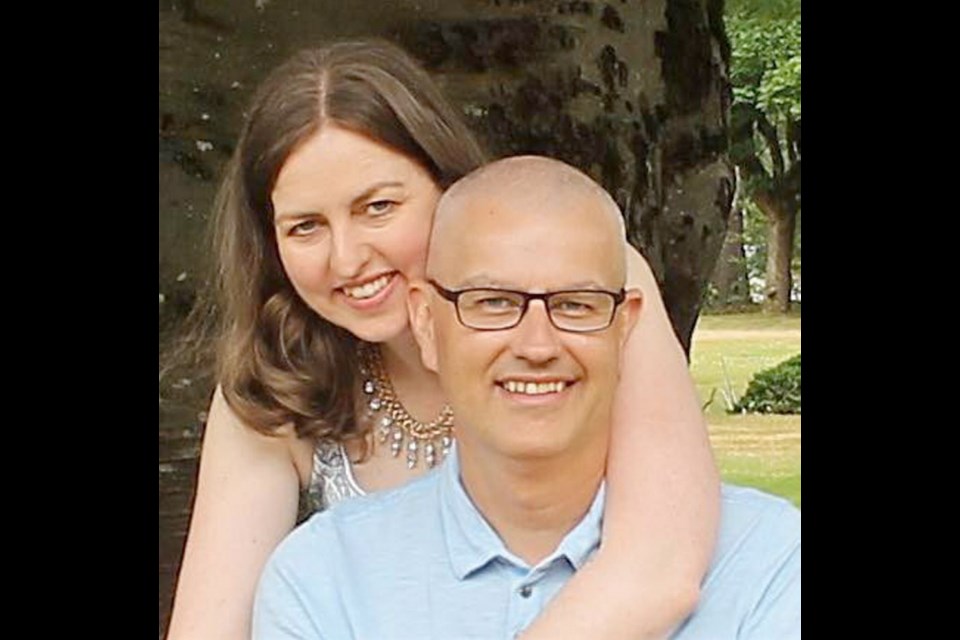The vehicle that struck and killed David Tilley on the Malahat two years ago was speeding at 101 km/h through a construction zone where highway safety improvements were underway, according to a B.C. coroner’s report.
The 46-year-old Vancouver man was killed and his wife, Justine, sitting in the passenger seat, was injured on June 9, 2018, when their southbound Honda CRV was struck head-on by a Dodge Caravan that crossed the centre line about 500 metres north of Aspen Road.
Tilley’s vehicle was going between 28 and 40 km/h through the construction zone at the time of the crash at 12:58 p.m., according to the coroner’s report.
Neither driver hit the brakes before the collision, the report found, based on evidence collected at the scene and through mechanical inspections of both vehicles. The Dodge Caravan hit the front driver’s side of Tilley’s SUV, sending the Honda spinning counterclockwise. It came to rest west of the place of impact.
Bystanders carried out emergency first aid on Tilley, who was pronounced dead after Malahat Fire, RCMP and B.C. Ambulance paramedics arrived. The cause of death was multiple traumatic injuries and blunt force trauma, and “third-party speed” was a significant contributing factor, the coroner found.
Road conditions that day were dry with clear visibility, according to the report. The vehicles collided at a slight curve in the road.
While the speed of the Dodge Caravan contributed to the severity of the collision, it “was not so great as to render the curve in the road unmanageable,” the coroner’s report found.
There was no physical or eyewitness evidence to indicate that the Dodge Caravan was out of control, the report said.
“The event data recorder from the Dodge Caravan indicates that the only record reaction to the impending collision took place approximately 0.5 seconds prior to collision when the accelerator pedal was released and there was a slight steering input to the right. This all indicates that the Dodge Caravan’s entry into the southbound lane was as a result of non-cognitive driving actions such as medical distress, fatigue, distracted driving or impairment.”
Tilley and his wife were married 18 years and loved to travel the world, according to his obituary.
Tilley was a chartered professional accountant who worked for Telus for 21 years. He was a sports enthusiast, a fan of the Vancouver Canucks, Vancouver Whitecaps and Buffalo Bills.
He is survived by his parents, Ruth and Bruce Tilley, his brother John and a large extended family in Newfoundland and B.C.
“He adored each of his nephews and loved playing the silly uncle,” the obituary said.
His father, Bruce Tilley, was a long-time councillor in St. John’s, Newfoundland.
An inspection of both vehicles found that the mechanical condition of the vehicles did not play a part in the crash, the report said.
The driver’s side curtain airbag of the SUV did not deploy, but analysis by the RCMP collision reconstructionist showed that, given the direction and speed of the Dodge Caravan, the airbag “would not have prevented the severe traumatic injuries Mr. Tilley sustained,” the report found.
Improvements, including highway widening and three kilometres of concrete medians, were completed on that stretch of highway by October 2018, and the 80 km/h speed limit was reduced to 60 km/h.
The coroner’s report said the concrete barrier will prevent similar crashes in the future.
The driver of the Caravan, Sara Thomas, has been charged with impaired driving causing the death of David Tilley and impaired driving causing bodily harm to Justine Tilley. Thomas is also charged with dangerous driving causing death and dangerous driving causing bodily harm.
Thomas was charged in July 2019. Her 15-day trial was set for May, but was cancelled because of the COVID-19 pandemic.
A new date for Thomas’s provincial court trial is expected to be set on July 21.
— With a file from Louise Dickson



